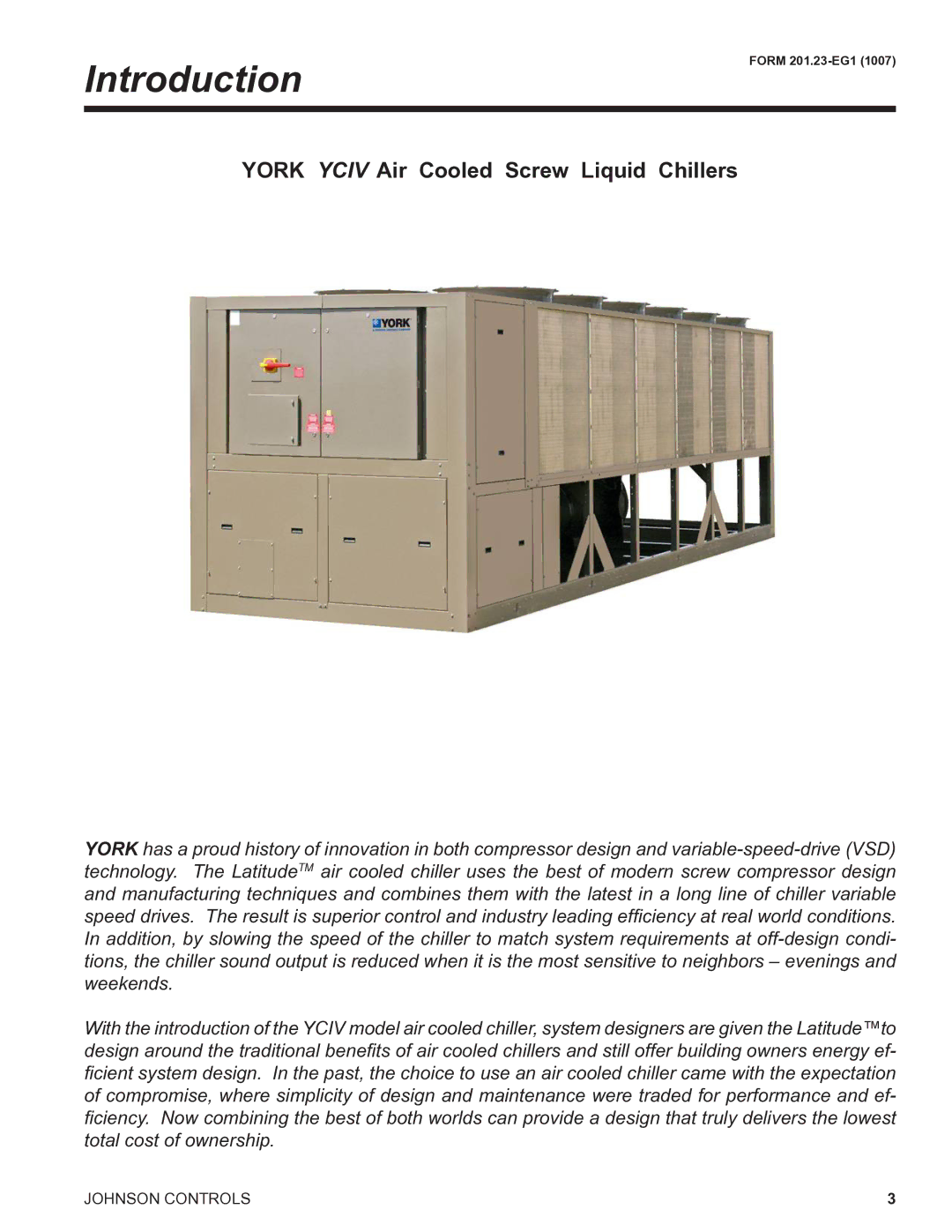Form 201.23-EG1
Table of Contents
York Yciv Air Cooled Screw Liquid Chillers
Introduction
Refrigerant Circuit
Specifications
Power and Electrical
M I H E R M E T I C Y O R K T W I N S C R E W Compressors
Evaporator
Condenser Section
Microprocessor Controls
Complete Factory Package
Protective Chiller Panels
Accessories and Options
MULTI-UNIT Sequence Control
Pressure Relief CE/PED Service Valve KIT
Evaporator Options
Building Automation System Interface
Nomenclature
Johnson Controls
Temperatures and Flows
0770S/P 0207S/P
0600S/P 0157S/P
0650S/P 0177S/P
0720S/P 0187S/P
Cooler Model number Yciv 60Hz 50Hz
Water Pressure Drop
SI Units
1340S/P
Evap Yciv Models
1070S/P
1180S/P
SI Units
Model YCIV0187S/P
Standard Efficiency Ratings English 460V/60Hz
Model YCIV0157S/P
Model YCIV0177S/P
Model YCIV0207S/P
Model YCIV0227S/P
Model YCIV0247S/P
Model YCIV0267S/P
Model YCIV0287S/P
Model YCIV0307S/P
Model YCIV0357S/P
Model YCIV0397S/P
Model YCIV0157E/V
Model YCIV0197E/V
High Efficiency Ratings English 460V/60Hz
Model YCIV0177E/V
Model YCIV0187E/V
Eiplv = 12.8 Viplv =
Model YCIV0207E/V
Model YCIV0227E/V
Model YCIV0247E/V
75.0 80.0
Model YCIV0267E/V
Model YCIV0287E/V
Model YCIV0327E/V
Model YCIV0357E/V
MODELYCIV0177S/P
AIR Temperature on Condenser C Lcwt
Standard Efficiency Ratings SI 460V/60Hz
MODELYCIV0157S/P
MODELYCIV0207S/P
MODELYCIV0227S/P
MODELYCIV0247S/P
25.0 30.0 35.0 40.0 45.0 46.0
MODELYCIV0267S/P
MODELYCIV0287S/P
MODELYCIV0307S/P
MODELYCIV0397S/P
MODELYCIV0357S/P
MODELYCIV0187E/V
High Efficiency Ratings SI 460V/60Hz
MODELYCIV0157E/V
MODELYCIV0177E/V
MODELYCIV0197E/V
MODELYCIV0207E/V
MODELYCIV0227E/V
MODELYCIV0247E/V
MODELYCIV0267E/V
MODELYCIV0287E/V
MODELYCIV0357E/V
MODELYCIV0327E/V
Model YCIV0720S/P
Standard Efficiency Ratings SI 400V/50Hz
Model YCIV0600S/P
Model YCIV0650S/P
25.0 30.0 35.0 40.0 45.0 46.0 KWi
Model YCIV0770S/P
Model YCIV0840S/P
Model YCIV0920S/P
Model YCIV1000S/P
Model YCIV1070S/P
Model YCIV1180S/P
Model YCIV1500S/P
Model YCIV1340S/P
Model YCIV0700E/V
High Efficiency Ratings SI 400V/50Hz
Model YCIV0590E/V
Model YCIV0630E/V
Model YCIV0760E/V
Model YCIV0800E/V
Model YCIV0830E/V
Model YCIV0930E/V
Model YCIV1050E/V
Model YCIV1120E/V
Model YCIV1380E/V
Model YCIV1220E/V
Standard Efficiency Ratings English 380V/60Hz
10.0
10.3
15.1
13.6 265.9
13.0 250.2
13.3 258.0
12.4 255.6
10.4 322.9
13.1 333.4
12.1 330.1
11.2 326.6
15.7
High Efficiency Ratings English 380V/60Hz
15.6
75.0
11.7 297.2
305.7
13.7 303.0
12.7 300.2
Standard Efficiency Ratings SI 380V/60Hz
Model YCIV0207S/P
Model YCIV267S/P
Model YCIV287S/P
Model YCIV307S/P
Model YCIV397S/P
Model YCIV357S/P
High Efficiency Ratings SI 380V/60Hz
Model YCIV0197E/V
Model YCIV0247E/V
25.0 30.0 35.0 40.0 45.0 46.0 KWi
Standard Efficiency
Physical Data English Standard Efficiency
Comp.s, Semihermetic Screw
General Unit Data 60Hz 0287 0307 0357 0397 50Hz 1070
0930
Physical Data English High Efficiency
High Efficiency
0800
General Unit Data 60Hz 0267
0327 0357 50Hz
1220
Physical Data SI Standard Efficiency
0770 0840
1000
Compressors, Semihermetic Screw
Physical Data SI High Efficiency
98176
General Unit Data 60Hz 0267
0327 0357 50Hz 1550
1380
29.1
Dimensions English
Models YCIV0157E/V and YCIV0157S/P
28.1
View D-D
80.0 230.0
Dimensions English
Yciv
88.1 274.0
Mounting Holes TYP Control Panel
22.2 26.0 79.1
Models YCIV0197E/V, YCIV0207S/P, and YCIV0227S/P
20.4 28.1 85.6 112.3
22.2 26.0 79.1 113.3
274
Models YCIV0207E/V and YCIV0227E/V
20 3/8 28 1/8 Edge of Unit
88 1/8
Mounting Holes TYP
Models YCIV0247S/P, YCIV0247E/V, and YCIV0267S/P
Wide X 13 1/2 High
22 3/16
Mounting Holes TYP APPROX. Operating Weight Distributing LB
Models YCIV0267E/V, and YCIV0287S/P
Mounting Holes TYP Control Panel
Models YCIV0287E/V
Mounting Holes TYP
Models YCIV0307S/P
Water Outlet Water Inlet Rigging Holes
Models YCIV0327E/V and YCIV0357S/P
Control Panel Origin
Models YCIV0357E/V and YCIV0397S/P
View D-D Origin
442
Dimensions SI
YCIV0590E/V and YCIV0600S/P
485
Water Outlet Rigging Holes
2032
Dimensions SI
YCIV0630E/V, YCIV0650S/P, YCIV0700E/V and YCIV0720S/P
2238
Dimensions mm Unless Otherwise Noted
YCIV0760E/V, YCIV0770S/P, and YCIV0890S/P
518
564
Mounting Holes TYP Origin Panel
518
YCIV0800E/V and YCIV0830E/V
Water Outlet Mounting Holes TYP
564
YCIV0920S/P, YCIV0930E/V, and YCIV1000S/P
Rigging Holes Water Outlet Each Side 76 X
View A-A 305
YCIV1050E/V and YCIV1070S/P
Rigging Holes Water Outlet Water Inlet Each Side 76 X
YCIV1120E/V
Power Single Point with Terminal Block Origin Panel
YCIV1180S/P
Water Outlet Water Inlet Each Side 76 X
YCIV1220E/V and YCIV1340S/P
101
YCIV1380E/V and YCIV1500S/P
103
Isolator Locations English
Model
Isolator Locations x , y in. and Point Loads lbs
2156
1753
1810
1775
High Efficiency English Model
Isolator Locations English
2493
1274
1839
2185
Isolator Locations SI
Standard Efficiency SI Model
Isolator Locations x , y mm and Point Loads kg
730
566
572
675
High Efficiency SI Model
658
492
500
601
For Units with ANY Point Load Above 1404 LBS 637 KG
Isolator Details
ONE Inch Deflection Spring Isolator CROSS-REFERENCE
For Units with ALL Point Loads Less Thatn 1404 LBS 637 KG
ND-DS
Neoprene Isolator CROSS-REFERENCE
English MBD ND-C
ND-D
Isolator Details contd
English Size HCL HCW MBD
Size HCL HCW MBD
Intentionally Left Blank
Electrical Data 2 Comp Standard Efficiency
Yciv S/P
OPT
Two-Speed Cond. Fans
Yciv S/P
Yciv E/V
Electrical Data 2 Comp High Efficiency
High Head/High Static Fans Two-Speed Cond. Fans
Form 201.23-EG1 High Efficiency Yciv E/V
FLA EA
Electrical Data 3 Comp Standard Efficiency
Field Wiring Lugs
Form 201.23-EG1 System
STD Terminal Block OPT Circuit Breaker
High Head/High Static Fans
Unit Short Circuit Field Wiring & Protection
Electrical Data 3 Comp High Efficiency
Withstand KA
Fuse/Ckt
Lugs/ Phase
Electrical Notes
Two COMPressor Wiring Diagram with Circuit Breaker
Power Wiring
126
127
Typical Control Wiring Two Compressor
129
Typical Control Wiring Three Compressor
131
Chilled Liquid Piping
Application Data
Unit Location
Foundation
Delivery and Handling
Guide Specifications
Part 1 General
Quality Assurance
Refrigerant Circuit Components
Compressors and Motors
Controls
Power and Electrical Requirements
PRE-COATED FIN Condenser Coils
Accessories and Options
Part 3 Execution Installation
138
139
Form 201.23-EG1 Supersedes 201.23-EG1 File in ET2

